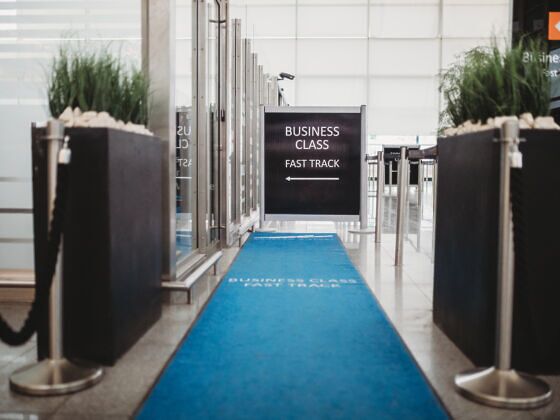The question has long been asked and answered in hushed tones and vague anecdotes: do the wealthy play by separate travel rules? On the one hand, the answer is obvious. Of course they do. They get extra legroom, seats that recline into beds, high-end lounge access, and maybe even an entire plane to themselves. But what about the one part of the airport experience that, theoretically, no one should be able to escape? As they say, there are only three certainties in life: death, taxes, and TSA. We know money can buy airport perks and upgrades, but can it actually buy you a watered-down, expedited version of security?


Is There a Separate Airport Security for Wealthy and High-Status Passengers?
It certainly looks that way sometimes when you’re slogging through security at a snail’s pace, and it seems like the business class line is absolutely flying. The resentment builds, and you wonder whether it’s all in your imagination or if these fliers are actually getting both a better inflight experience and a lighter touch in security.
It may not come as a complete surprise to learn that the answer is something of a gray area, depending largely upon the airport, airline, and type of ticket you have. At some airports, the special treatment for higher tier travelers is something of an illusion.
“Business or first-class travelers may find security goes faster because there are just less people on flights that are in those classes,” Tracy Thomas, founder of T. Thomas Group, a luxury travel group, tells Matador Network. “Security for those classes is often smooth sailing with no wait. But the same security protocols will exist, such as removing laptops and coats.”
Thomas admits that some airports do have separate security perks for business travelers and VIPs though those perks don’t necessarily amount to skipping security altogether.
“In London Heathrow, passengers of Virgin Atlantic ‘Upper Class’ have an entirely different, more quiet and private security line to go through,” she says.
Indeed, airport security is notoriously inconsistent, meaning some airports may treat business class passengers with more deference than others.
“While the core security requirements remain consistent across all passenger classes, business class passengers may bypass certain non-critical steps, such as removing shoes or laptops from bags, in some airports,” Arsen Misakyan, the co-founder of LAXcar, a private and event transportation services provider, tells Matador Network. “This is less about fewer security requirements and more about enhancing the customer experience for premium passengers.”
Perks for wealth and status also vary by individual airline. American Airlines, for example, has a “secret” VIP service that, apparently, if you have to ask about it, you probably can’t afford it.
“American Airlines has a service (they don’t advertise it) that lets customers pay a fairly hefty fee for an airport VIP ‘escort’ through many US airports, no matter what class of flight,” Thomas says. But even then, VIPs don’t get to actually skip security, they just get escorted to the front of the line. Airports like JFK and LAX, among others, even have a reservation program, allowing you to book your security check in advance to skip the line. But again, the actual screening process will likely be the exact same.
With the exception of belonging to a program like TSA PreCheck or CLEAR, it seems the closest thing to actually skipping an airport security line, or getting a somewhat lighter screening, is flying private.
Flying private
It’s not a total surprise that flying on a private jet gets you the best airport perks – namely, not actually having to go to the airport at all. Indeed, private passengers go to separate, much smaller terminals called Fixed Base Operators (FBOs) for their security screenings. Here, the security environment is exponentially less congested, and passenger risk assessment is handled differently.
“Many of the routine security steps like removing shoes, belts, or jackets and scanning of personal electronics are not required,” Justin Crabbe, CEO of Jettly, a private jet rental company, tells Matador Network. “However, it’s important to note that all luggage and passengers are subjected to security checks; they are just more discreet and respectful of privacy.”
Is this because people who can afford private jets are inherently less dangerous people? That certainly seems to be the rationale.
“The justification for these differences usually hinges on the reduced risk profile associated with private aviation,” Crabbe says. “With fewer passengers to monitor and a more controlled environment, security concerns, while still paramount, are managed differently. The exclusivity and control over who boards the aircraft significantly reduce potential threats, allowing for a streamlined process.”
Security or efficiency?
Though clearly procedures vary by airport and by airline, if wealthy and statused passengers do get somewhat preferential treatment, the big question is: does increased efficiency for private and business class passengers compromise security?
According to Misayakan – no, it doesn’t.
“The efficiency in security for higher-class passengers is not a compromise on safety but an optimization of process,” he says.
His claim is supported by The Department of Homeland Security’s Annual Performance Report 2021-2023, which found no decrease in security effectiveness in expedited lanes. These lanes are designed specifically to manage passenger flow without sacrificing safety.
It’s worth noting that TSA rules for economy passengers haven’t been proven to increase passenger safety, despite the rigidity of those rules. In 2015, the Department of Homeland Security had undercover investigators try to smuggle mock explosives or banned weapons through various airport checkpoints around the country. Discouragingly, 95 percent of those trials were successful, with TSA agents failing to catch the investigators 67 out of 70 times. The result? The resignation of then-chief of the TSA, Melvin Carraway.
As for whether wealth and status can truly buy your way through security, a definitive answer remains elusive. Passenger security processes vary widely by airport, airline, and fare type, and while a higher passenger tier likely means you’ll have a much smoother experience, it doesn’t mean you’re completely out of the TSA woods.